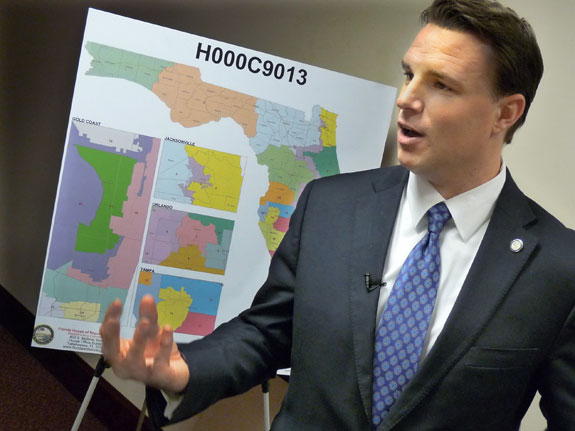
House Speaker Will Weatherford, R-Wesley Chapel, said he would rather go home without a plan than come to a quick decision on health care reform in Florida. (Photo courtesy of the Florida Legislature.)
By Ashley Lopez
Florida Center for Investigative Reporting
Florida’s legislative session ends in two weeks and state lawmakers say they might not reach a decision on whether to accept the federal government’s health care reform money to expand Medicaid — or health insurance — to more Floridians.
The Miami Herald/Tampa Bay Times reported that lawmakers have signaled they likely will leave Tallahassee soon and postpone a decision for a year.
“It’s not something you put together in a week,’’ said Sen. John Thrasher, R-St. Augustine, chairman of the Senate Rules Committee and a close advisor to Senate President Don Gaetz. “It’s a very big, complicated issue and these issues take some time.”
He said he does not expect there would be any political repercussions if the Republican-led Legislature waits another year, even though it would mean forgoing for one year at least the estimated $5 billion in federal funds that could be drawn down under the plan to implement Medicaid expansion.
“There is no fallout,’’ Thrasher told the Herald/Times on Monday. “Anytime you walk away from something, there is going to be someone who is not happy. On something like this, however, it needs to be done right.”
Gov. Rick Scott has said he supports accepting the federal dollars to expand Medicaid and has asked state lawmakers to consider the plan. For the first few years, the federal government will pay for 100 percent of the expansion’s cost in Florida.
The more conservative Florida House has proposed its own plan, which would subsidize health insurance for a small number of Floridians and would not accept any federal money associated with the health care law. Scott has supported a more moderate plan from the Florida Senate, which includes accepting the money and offering private insurance through Healthy Kids, a public-private partnership organization, to some of the state’s poorest residents.
While most of the GOP-led Florida Legislature seems unwilling to accept the health care money, unions and hospitals have been pleading with elected officials to accept it.
As WUSF reports, hospitals have a lot to lose if the state doesn’t take the money:
The only hope in cracking through the resistance, they say, is by warning representatives that a “no” vote may mean their local hospital will close.
As of Jan. 1, when most of the Affordable Care Act takes effect, hospitals’ subsidies for treating the uninsured are getting whacked. That’s because the health law assumed hospitals wouldn’t have many uninsured patients anymore.
But the Supreme Court said states could choose whether to accept the federal funds to cover the uninsured. So far the Florida House is saying no.
Gov. Rick Scott and the Senate are saying yes. A plan by Sen. Joe Negron called Healthy Florida, which was unanimously passed by a key committee on Wednesday, would accept the federal funds and use them to subsidize the purchase of private coverage. Health officials in Washington have hinted they’d approve it.
However, House Speaker Will Weatherford, R-Wesley Chapel, said he would rather go home without a plan than come to a quick decision on the matter.
Scott, who used to run a large hospital chain, has supported taking the money for Medicaid but has not actively lobbied members of the Legislature to accept it. Even though Scott understands the problems the hospitals would face if the federal dollars are not accepted, Scott has also spent most of his political career fighting the health care law.
Either way, the Herald/Times reports that even if lawmakers decide to postpone their decision, these problems won’t go away:
“This issue doesn’t end the last day of session,’’ said Tom Feeney, executive director of Associated Industries of Florida on Monday. The lobbying organization represents several hospitals and health care providers. “The pressure continues to build and the pressure will get worse on people,’’
Feeney, a former House speaker and congressman from Orlando, believes that if legislators fail to resolve the issue the health care industry will work on House Republicans to shift their thinking and find a way to cover one million Floridians who could be eligible for coverage.
“Right now it’s only the providers in the health industry that are screaming and hollering but, as the ramifications actually kick in, where you’re going to have hospital cutbacks and services cutbacks and businesses around the state get their bills for insurance, I think it’s going to become increasingly apparent that it makes no sense to walk away from $5 billion a year,’’ he said.
Scott could call the Florida House and Senate into a special session. But a resolution would need to be worked out by both chambers ahead of time.
